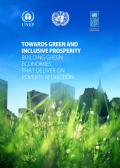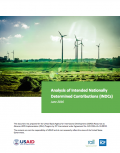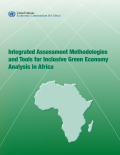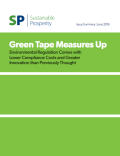
This report contributes new insights into the growing body of literature on inclusive green economy approaches as a key means for eradicating poverty and advancing the evolving post-2015 sustainable development agenda. The report draws on a range of country experiences and a series of case studies commissioned through the UNDP-DESA-UNEP Joint Programme Supporting a Green Economy Transition in Developing Countries and LDCs: Building Towards Rio+20 and Beyond, with the generous support of the Government of The Netherlands. Its non-prescriptive findings are designed to inform country-led efforts to transition to greener, more inclusive economies in ways that deliver on poverty reduction.
Armenia and Georgia are taking the climate change agenda seriously and contributing to efforts for mitigating global climate change through various ways, including preparation of low-carbon development strategies for their future economic growth. The improvement of energy efficiency is one of the key elements of the low-carbon development strategies. This study develops a methodology to estimate a marginal abatement cost curve for energy efficiency measures and applies it to the building sector in both countries. The study finds that among the various energy efficiency measures considered, the replacement of energy inefficient lightbulbs (incandescent lamps) with efficient lightbulbs is the most cost-effective measure in saving energy and reducing greenhouse gas emissions from the building sector. Most energy efficiency improvement options considered in the study would produce net economic benefits even if the value of reduced carbon is not taken into account.

This white paper provides an analysis of the Intended Nationally Determined Contributions (INDCs) for 37 partner countries in the U.S. Government's Enhancing Capacity for Low Emission Development Strategies (EC-LEDS) program and other designated priority countries. The white paper includes an overview of global INDCs, country profiles for countries, regional trends, and sectoral trends. Moreover, each country profile includes information from the INDC on the:

The inclusive green economy has gained considerable attention in past years as an action-oriented approach and one of the tools for realizing sustainable development. The main contribution of this approach has been identified as integrating economic, social and environmental dimensions of development policies in a coherent, cross-sectoral framework of analysis. As governments begin to develop and implement inclusive green-economy strategies, more attention is being given to research into the use of methodologies and tools to identify social, economic and environmental trends, and the evaluation of the likely outcomes of implementing inclusive green economy policy.

There is a growing body of evidence that environmental regulations can support strong economic performance. This report from Sustainable Prosperity finds that environmental regulation comes with lower compliance costs and greater innovation than previously thought.
In 2014, researchers at the OECD constructed the first comprehensive set of data on environmental strictness and found that “an increase in stringency of environmental policies does not harm productivity growth.” We know this to be true for specific policies as well – the United States SO2 market has led to a greater than expected emissions reduction, at less than half the predicted compliance costs. The same good news story has been seen in Canada – The introduction of British Columbia’s carbon price coincided with a 16% decrease in overall fuel use in its first 5 years, at the same time that the province’s economy grew slightly more quickly than the rest of Canada’s.
